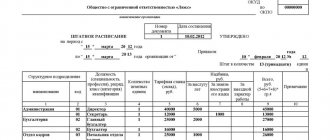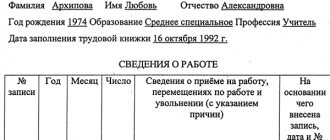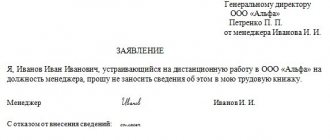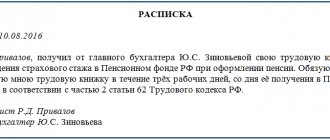When are you required to issue a work book upon dismissal?
Based on Art. 84.1 of the Labor Code of the Russian Federation, on the last working day, the employer issues to the employee either a traditional paper work book or duly certified information about work activity (form STD-R). Any delay is interpreted as a violation, and the employee is entitled to compensation for failure to issue a work book upon dismissal, even if the delay due to the employer’s fault was one day (Article 165 of the Labor Code of the Russian Federation).
Read more: Rules for issuing a work book to an employee upon dismissal
But if for some reason the person himself could not come for the documents (for example, due to illness), then the personnel officer (another authorized person of the company) by virtue of the same article. 84.1 of the Labor Code of the Russian Federation prepares a notification about the need to come for them or give consent to send them by mail. Such notification should be sent by registered mail with notification and preferably with an inventory of the attachment. This will avoid disputes about the contents of the shipment in the event of litigation. By sending a notice, the employer declines responsibility for the failure to issue or delay the employee’s length of service papers, regardless of how long it takes to hand them over to the owner.
Read more: New form STD-R: information about the employee’s work activity
Compensation for lost earnings for delayed work records
According to Art. 165 of the Labor Code of the Russian Federation, employees are provided with guarantees and compensation in connection with the delay due to the fault of the employer in issuing a work book upon dismissal. The employer is obliged to compensate the employee for the earnings he did not receive in all cases of illegal deprivation of his opportunity to work. Such an obligation arises not only due to a delay in issuing a work book to an employee, but also when an incorrect or non-compliant formulation of the reason for dismissal is included in it (Article 234 of the Labor Code of the Russian Federation).
Note
. An entry in the work book about the basis and reason for termination of the employment contract must be made in strict accordance with the wording of the Labor Code of the Russian Federation or other federal law and with reference to the relevant article, part of the article, paragraph of the article.
In accordance with Art. 84.1, 234 of the Labor Code of the Russian Federation, legally significant for resolving the issue of the employer’s financial liability for the delay in issuing a work book are such circumstances as the date of issue of the work book and the presence or absence of the employer sending a notice to the employee about the need to appear for the work book. It should be said that the listed norms are formulated imperatively. Failure to fulfill obligations to timely issue a work book will entail the application of measures to the employer.
The employee’s right to payment of average earnings for a delay in issuing a work book arises from the next day after dismissal, when the work book was not issued, and lasts until the day of its issuance or notification of the need to appear for it or consent to its sending by mail (Appeal Determination Investigative Committee for Civil Cases of the Omsk Regional Court dated 02/01/2017 in case No. 33-582/2017).
The condition for the employer's financial liability to the employee for the delay in issuing a work book is considered to be the employer's guilty behavior, which deprived the employee of the opportunity to work.
Let us explain what can be interpreted as guilty behavior using an example from the practice of the Orenburg Regional Court (Review of the practice of considering civil cases on appeal for the second quarter of 2017, approved at a meeting of the Presidium of the Orenburg Regional Court on July 10, 2021).
The essence of the case: a citizen filed a lawsuit against her former employer for the recovery of wages due to the delay in issuing a work book. In support of her demands, the citizen indicated that the delay in issuing the work book deprived her of the opportunity to find a job. When considering the case, the court found that the employee was dismissed from work in the company on October 31, 2021 at her own request. The work book was sent to her by mail on December 16, 2021, and she received it on December 29, 2021. All this time, the citizen could not find a job.
In deciding to satisfy the claims, the court of first instance proceeded from the fact that the delay in issuing the work book is the basis for compensating the employee for the earnings he did not receive due to illegal deprivation of the opportunity to work. However, the judicial panel for civil cases recognized this court decision as subject to cancellation. In her opinion, the employer’s obligation to compensate the employee for material damage in the form of lost earnings occurs only if the employer’s illegal actions prevented the employee from taking another job and, as a result, resulted in the deprivation of the employee’s opportunity to work and receive wages.
In other words, the legally significant circumstance in this case is the establishment of the fact that the plaintiff, after dismissal, applied to other employers for the purpose of employment and the fact that this was refused due to the lack of a work book. Moreover, the responsibility to prove these circumstances rests with the employee.
In the situation under consideration, the citizen did not provide the court with evidence that, firstly, she was trying to get a new job, and secondly, she was denied employment precisely because of the lack of a work book (Appeal ruling dated 06/07/2017 N 33-4078 /2017). As a result, the court decision was not in favor of the former employee.
However, not all courts adhere to this point of view. Some of them make decisions based on the fact that the employee is not required to prove that he could not find work. So, for example, the Saratov Regional Court considered these circumstances not significant for resolving the dispute (Reference based on the results of studying the practice of consideration by the courts of the Saratov Region in 2021 of civil cases in disputes over wages, the text was published on the website of the Saratov Regional Court https://oblsud .sar.sudrf).
The essence of the case: a citizen filed a lawsuit against his former employer to recover compensation for the delay in issuing a work book and compensation for moral damage. In refusing to satisfy the claims, the court of first instance proceeded from the fact that the employer’s obligation to compensate the employee for material damage in the form of lost earnings occurs in the event of the employee being deprived of the opportunity to work and receive wages. At the same time, the mere fact of non-issuance of a work book on the day of dismissal, the employer’s failure to send a notice to the employee about the need to appear for a work book or to agree to send it by mail is not a sufficient basis for imposing this responsibility on the employer.
The court stated in its decision that, according to Art. 12, 56 of the Code of Civil Procedure of the Russian Federation, the plaintiff had to prove that it was his lack of a work book that led to the impossibility of employment and earning money, and he also had to provide evidence of the amount of lost earnings, but he did not provide such evidence. No evidence was provided that the citizen took measures to find employment.
The basis for the recovery of compensation for moral damage by the plaintiff was the fact that he could not find a job due to the lack of a work book, and this requirement is derived from the demand for compensation for lost earnings. The citizen did not prove the fact that he was unable to find a job due to the lack of a work book, so the court recognized that there were also no grounds for collecting compensation for moral damage on this basis.
However, the panel of judges found the above conclusions of the court to be erroneous. The Saratov Regional Court stated that the court of first instance had no right to refuse to collect compensation for moral damage in favor of the plaintiff. In order to correct a judicial error made during the consideration of the case by the court of first instance in the application of substantive law, which led to the issuance of an unjust decision, the judicial panel recognized the decision of the court of first instance as subject to cancellation with a new decision to satisfy the claims.
It must be said that this position is shared not only by the Saratov Regional Court, but also by other courts, for example the Supreme Courts of the Republic of Karelia (Determination dated 08.11.2016 N 33-4423/2016) and the Republic of Bashkortostan (Definition dated 09.27.2016 N 33-19280/ 2016), as well as the Volgograd Regional Court (Determination dated September 16, 2015 N 33-10006/2015).
So, the second situation is diametrically opposed to the first, which suggests that there is no consensus in the judicial community on this issue.
We emphasize that the employer’s violation of the established deadline for issuing a work book to an employee upon dismissal is precisely the basis for his obligation to pay compensation to the employee for the time of delay in issuing the work book. However, this violation is not a basis for declaring the dismissal illegal or for reinstating the employee at work (Determination of the Investigative Committee for Civil Cases of the Armed Forces of the Russian Federation dated November 25, 2011 N 19-B11-19).
Liability for delay
Untimely transfer of documents on length of service to a dismissed employee is considered as an illegal deprivation of a person’s opportunity to work, since without such documents the new employer will not be able to employ the employee (Article 234 of the Labor Code of the Russian Federation). For such a violation, financial liability is provided in the form of compensation for forced absenteeism, which a person has the right to demand both pre-trial and in court.
IMPORTANT!
If you decide to file a claim for compensation for a delayed work record, please note that some courts are looking into whether such a violation on the part of the employer actually led to the inability to find a job. The mere fact of delay and later issuance of documents is not always enough to bring the company to financial liability and pay compensation (see, for example, the Appeal ruling of the Supreme Court of the Republic of Mari El dated July 24, 2018 in case No. 33-1207/2018).
What if the work book was not issued on time?
If the work book was not issued on time, you should not let such actions of the employer go unnoticed.
Even if you did not suffer any losses from such behavior, the action was performed unlawfully, which means you must hold the lawbreaker accountable. You can contact the labor inspectorate.
The result of such an appeal will be the appearance of inspection employees in the organization, where appropriate checks of the documents of the personnel department will be carried out on how work books, magazines are maintained and how the labor rights of workers are respected.
If, in addition to your case, other violations are found, the organization will suffer a fine for its actions , but you will not experience any favorable consequences on your wallet other than moral satisfaction.
As for more punitive measures, you have the right to go to court.
Perhaps, by its delay in issuing the document, the employer puts you in an awkward position regarding employment in another job, and so on.
You incur losses because you do not receive wages or other income. The employer must answer for this in court, where, in fact, you must invite him.
How is compensation for delay calculated?
It can be difficult for workers to independently make an accurate calculation of compensation for the delay in issuing a work book, since this requires knowing:
- average daily earnings - its calculation is carried out in the manner prescribed by Government Decree No. 922 of December 24, 2007;
- the number of days of forced absence when a person could not find a job due to lack of documents on work experience.
Read more: Calculator for calculating average daily earnings upon dismissal
If these data are known, the formula for calculation is simple:
Using the formula, we will try to calculate compensation for the delay of the work book for a week - 5 working days. To simplify the calculations, let’s assume that the average employee’s earnings were 404 rubles. (approximately this amount will be obtained if the employee receives a minimum salary equal to the federal minimum wage without regional coefficients and allowances).
We substitute all the values into the formula and get:
404 x 5 = 2,020 rub.
This amount should be paid as compensation for the inability to find a job.
IMPORTANT!
Before paying the calculated amount for the delay, withhold personal income tax and charge insurance premiums on it (see Article 217 of the Tax Code of the Russian Federation, letter of the Ministry of Finance No. 03-04-05/36473 dated July 24, 2014), since this is compensation for forced absence .
Statement of claim for non-issuance of a work book?
Before going to court, you should know what documents need to be provided to this authority.
Of course, you must have your version of the employment contract and other documents confirming the fact of your work in the organization. Also, you must properly file a claim for non-issuance of a work book. We will tell you exactly how this document is drawn up in our article.
Where to submit?
The statement of claim according to all the rules is submitted to the court . In order to understand the jurisdiction and determine more specifically the court to which you want to send your application, you need to know well where the office of your employer is registered. An application for the return of a work book is submitted at the location of the defendant, that is, the organization where you performed your labor function.
This application must be supported by such necessary documents as a state fee , which must be paid in your name , as well as documents that prove the fact of your work in this organization.
These can be photocopies of an employment contract, an employment contract, as well as other documents confirming the fact of your work in the organization. But, of course, the most important document of all of the above is the statement of claim. How to compile it in accordance with all the rules and legal requirements is in our next paragraph.
How to compose it correctly?
A statement of claim is drawn up on an A4 sheet. Be sure to come to court and take a sample of filling out this document. If there is no example in court, look for similar statements on the Internet.
On the right is the name of the court where you are sending the statement of claim, as well as contact information about the defendant and the plaintiff.
In the general text of the application, you must indicate, referring to the articles of the Labor Code, where and in what way your rights were violated.
Try not to make the recording emotional. State everything briefly and succinctly, in legal language. If you cannot write facts this way, contact a lawyer.
Your statement must also include estimates of the damage you suffered . Try not to exaggerate your requirements. Also, do not forget to indicate the documents that are also attached to your statement of claim. At the end of the application there must be the seal and signature of the plaintiff, that is, you .
Only by following all the recommendations we have given will your application be accepted by the court and considered. If you deviate from our instructions, your statement of claim will not be accepted and will be returned to you for revision or resubmission.
How to make a payment
If the parties have resolved the issue amicably, the employee writes an application for payment of compensation. Based on such a request, the employer issues an order and pays the due amount. A similar order will be needed if the court has ordered compensation to be paid.
Among other things, the personnel officer additionally enters a new date of dismissal into the book, indicating in the last column (reason) the details of the court decision or order on the new day of dismissal. The previous record of dismissal is declared invalid. This is stated in government decree No. 225 of April 16, 2003.
Read more: Rules for filling out a work book
We will show you what each of the documents needed by the HR officer to process the payment looks like.
Sample letter from an employee
| General Director of Clubtk.ru LLC A. V. Voronov from the driver Zapashnykh I.A. Statement On June 16, 2021, I resigned from Clubtk.ru LLC of my own free will. But they didn’t give me a work book that day, explaining this by the absence of the head of the personnel department, I. I. Ivanov, due to illness. Based on Art. 61 and Art. 234 of the Labor Code of the Russian Federation, I ask you to issue me a work book and pay compensation for the delay in issuing it. 07/02/2020 Zapashnykh I. A. |
Sample order for payment of compensation
| Limited Liability Company "Clubtk.ru" St. Petersburg 07/03/2020 Order No. 56 on payment of compensation for the delay in issuing a work book Based on Articles 165 and 234 of the Labor Code of the Russian Federation, clause 35 of the Rules, approved. Government Decree No. 225 of April 16, 2003, I ORDER:
General Director Voronov Voronov A.V. I have read the order: chief accountant Smirnova Smirnova V.I. Head of HR Department Ivanov Ivanov I.I. |
Sample of making changes to the work book:
IMPORTANT!
Do not forget to include data on the employee in the SZV-M report up to the month in which he received the documents on his experience.
Read more: Filling out SZV-M upon dismissal of an employee
Limitation periods in labor disputes. Material liability
Author: Anastasia Volkova
Author: Anastasia Volkova, practicing lawyer
Analyzing the judicial practice of considering cases related to the financial liability of employees, the courts in their decisions correctly use the norms of substantive and procedural law that resolve controversial relations.
In resolving cases of this category, the courts take into account the norms of the Labor Code of the Russian Federation, the explanations of the Plenum of the Supreme Court of the Russian Federation, which are contained in Resolution No. 2 of March 17, 2004 and No. 52 of November 16, 2006.
But there are cases when, when considering cases, the circumstances that are relevant to the case are not always correctly determined, the norms of labor legislation are incorrectly interpreted, or when making a decision, norms that are not subject to application in this category of labor disputes were used.
The first example of judicial practice concerns a violation of the rights of an employee by the employer, which is associated with the refusal to issue a work book. According to Art. 392 of the Labor Code of the Russian Federation, such an action is long-term in nature, and the period for going to court is calculated from the moment the employee receives a work book or from the moment he receives a notification from the employer about the need to appear to receive documents.
Thus, citizen K. went to court with a demand to recover from the employer IP N. compensation for the delay in issuing a work book, as well as to compensate for the moral damage caused by such a case.
The court did not satisfy the plaintiff’s demands, citing that citizen K. missed the deadline for filing a lawsuit, the beginning of which the court determined from the moment of citizen K’s dismissal. The panel of judges did not agree with the decision of the lower court. In this case, the court made an erroneous decision, the basis of which was the incorrect interpretation and application of Art. 392 of the Labor Code of the Russian Federation, which establishes that if a labor dispute arises, an employee has the right to go to court within three months from the moment he became aware that his right was violated.
In turn, in Part 4 of Art. 84.1 of the Labor Code of the Russian Federation stipulates that the issuance of a work book is carried out on the day the employment contract expires. If it is impossible to issue a document due to the absence of an employee or refusal to receive it, the employer must notify the employee with a notice of the need to come to the enterprise to receive a work book or give consent to send the document by mail. If the employer sent this notification, in this case he is not responsible for the delay in issuing or non-issuance of the work book (Part 6 of Article 84.1 of the Labor Code of the Russian Federation).
Also according to Art. 234 part 1 clause 3 of the Labor Code of the Russian Federation, the employer pays wages not received by an employee when he was illegally deprived of the opportunity to work due to a delay in issuing a work book.
As a result, the conclusion follows that according to the law, the employer is obliged to issue a work book on the day the employment relationship with the employee ends. If the assigned duties are not fulfilled, the legislator provides for an additional obligation in this case to compensate for damage caused during the delay in issuing the work book until the day of actual issue. Accordingly, this labor dispute over a violation of the employee’s rights associated with the non-issuance of a work book is ongoing, and this violation lasted until the employer issued a work book. The plaintiff received a work book on November 4, 2013, and he went to court on November 23, 2013. In such a situation, the court’s refusal to satisfy the plaintiff’s demands, citing the missed deadline for applying for judicial protection and the application of a statute of limitations to controversial labor relations, is not based on the above substantive norms.
This is important to know: Civil claim in criminal proceedings, sample statement of claim to court: sample
The panel of judges based on Art. 361 of the Code of Civil Procedure of the Russian Federation considered the cassation appeal and overturned the decision of the lower court. The case was sent for a new trial because the identified violations cannot be corrected by the court of cassation due to the fact that the case materials did not contain accurate information about the average salary of the plaintiff. Citizen K., when considering the case in the court of first instance, indicated different salary amounts, justifying this with various written evidence.
The deadline for going to court in labor disputes regarding the collection of monetary compensation if the employer violates the specified deadline for payments upon dismissal in accordance with Art. 392 part 1 of the Labor Code of the Russian Federation begins not from the date of dismissal, but from the moment of repayment of all debts to the employee by the employer (Article 236 of the Labor Code of the Russian Federation).
Citizen P. appealed to the court with a demand to recover from the enterprise arrears in payment of monetary compensation for non-received material property, as well as interest for violation of deadlines for dismissal payments and compensation for moral damage.
The court did not satisfy the claims of citizen P.
When making a decision regarding the collection of interest for violation of deadlines for payments upon dismissal, as well as compensation for moral damage, the court proceeded from the fact that the defendant, before the court decision, had paid all compensation for the lost property. As for the collection of interest for violation of deadlines for dismissal payments and compensation for moral damage, the plaintiff missed the deadline for filing a lawsuit, which, according to Art. 392 of the Labor Code of the Russian Federation is three months, the application of which was announced by the representative of the defendant. The court decided that the period should be calculated from the moment of citizen P.’s dismissal - from 08/04/2010.
The panel of judges, when considering the case materials, did not agree with the court's decision and considered it erroneous due to the fact that the court incorrectly interpreted and applied the rules of substantive law that govern this labor dispute.
According to Part 1 of Art. 392 of the Labor Code of the Russian Federation, each employee has the right to go to court if an individual labor dispute arises within 3 months. The period begins to run from the moment the employee learns of a violation of his rights.
In this case, the court of first instance accepted the date of dismissal as the beginning of the expiration of the term, but in this situation the date of the beginning of the period should be the date of full repayment of the debt by the employer to the employee, namely November 28, 2013.
The plaintiff went to court on November 5, 2013. Therefore, the decision of the court of first instance that the plaintiff missed the deadline to go to court is considered incorrect and subject to cancellation.
According to Art. 236 of the Labor Code of the Russian Federation, if the employer has not paid wages, vacation pay and other payments due to the employee on time, the employer pays the above payments, taking into account the payment of interest, which must be at least 1/300 of the refinancing rate of the Central Bank of the Russian Federation from the unpaid amounts for every day of delay, starting from the next day after the due date for payments until the day of actual settlement. Payment compensation may be increased in accordance with a collective agreement or other local act. The employer is obliged to pay these payments regardless of whether the employer is at fault or not.
Taking into account the above, the judicial panel decided that for the period from 08/05/2010 to 11/28/2013 inclusive, in favor of the plaintiff, the defendant is obliged to pay interest for violating the deadline for dismissal payments, which are calculated in accordance with Art. 236 Labor Code of the Russian Federation.
On November 30, 2013, LLC “I” ceded to the new creditor LLC “A” the right to claim the return of funds incurred for tuition fees on the basis of an employment contract and an additional agreement to it. The plaintiff was notified of this event regarding the assignment of the right of claim, but the obligations were never fulfilled. The plaintiff believes that the statute of limitations has not expired in this case, since reimbursement of costs to the plaintiff does not constitute damage to the employer, and in this case Art. 392 of the Labor Code of the Russian Federation cannot be applied in court. The defendant believes that the change in persons in the obligation in accordance with Art. 201 of the Civil Code of the Russian Federation does not change the limitation period and the moment when it begins to be calculated. And according to Art. 238 of the Labor Code of the Russian Federation, the employee’s financial liability provides for compensation for direct damage caused.
In Art. 249 of the Labor Code of the Russian Federation directly states that upon dismissal of one’s own free will before the end of the contract and in the presence of an agreement on training at the expense of the employer, the employee is obliged to reimburse the costs incurred in proportion to the actual time not worked after training. Reimbursement of funds provides for the full financial responsibility of the employee.
Since the defendant was fired on October 15, 2013, the limitation period should be calculated from October 16, 2013, and believes that the plaintiff missed the limitation period, which is one year, calculated from the moment the damage was caused. Therefore, the court requires the plaintiff to refuse due to the missed statute of limitations.
The court, based on the case materials, found that the claim was filed only on January 20, 2015. According to Art. 392 of the Labor Code of the Russian Federation, the employer has the right to file a claim in court for compensation for damage incurred by the employee within a year from the day the employer discovered the damage caused to him.
Therefore, the statute of limitations must be calculated from the moment the employee was dismissed, i.e. from October 16, 2013. In this case, the court did not satisfy the plaintiff’s demands on the basis that, in accordance with Art. 392 of the Labor Code of the Russian Federation, he missed the statute of limitations. The plaintiff, in turn, did not provide the court with written evidence that confirms a valid reason for missing such a deadline.
Having analyzed the category of labor relations associated with financial liability, we come to the conclusion that the courts in most cases made the right decisions in these labor disputes. Difficulties most often arose with the application and interpretation of labor legislation, as well as the calculation of the moment from which the statute of limitations begins to run.
When the employer does not pay for the delay
In Art. 84.1 of the Labor Code of the Russian Federation lists situations when you do not have to pay anything for a delayed work book. Among them:
- The employee refused to receive documents by hand or by mail, which was documented.
- The last working day and the day of registration of termination of the working relationship coincided in the following cases:
- dismissal of an employee for absenteeism (clause “a”, clause 6, part 1, article 81 of the Labor Code of the Russian Federation);
- convicting an employee to a punishment that precludes continuation of work, in accordance with a court verdict that has entered into legal force (clause 4, part 1, article 83 of the Labor Code of the Russian Federation);
- dismissal of a woman with whom the contract was extended in accordance with Part 2 of Art. 261 of the Labor Code of the Russian Federation until the end of pregnancy or until the end of maternity leave.
Read more: If the day of dismissal falls on a holiday
To minimize the risks of paying compensation, we have developed a reminder of what needs to be done to relieve responsibility for the delay of the work book:
- On the last working day, issue the employee with documents about the length of service, having first checked the accuracy of all records.
- If a person refuses to take the papers, record this in a separate act in the presence of witnesses.
- If the employee cannot pick up the documents about the length of service on the day of dismissal, prepare and send him by mail a notice of the need to receive the documents or agree to send them by mail the very next working day.
- After receiving consent, send the documents to the person by registered mail with a list of the attachments.
- If consent is not obtained, leave the papers in the safe until their owner or his relatives contact you (in the event of the death of a former employee).
Delay in issuing a work book: employer's responsibility
If on the day of dismissal the employee is not issued a work book, the employer is held liable on the basis of Art. 35 of Resolution No. 225. At the same time, penalties are applied in cases where the employer is found guilty of the employee’s failure to receive a work book within the prescribed period. If there is a delay in issuing a work book, the day of dismissal of the employee is considered the day when the employee actually received the work book (taking into account the delay). The original date of termination of the employment contract in this case is considered invalid.
In addition, the employer may be held liable if, when filling out the work book, the responsible employee entered an incorrect reason for dismissal, as well as if the work book is filled out with wording that does not comply with federal legislation.











